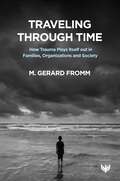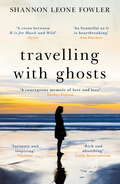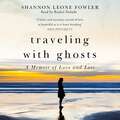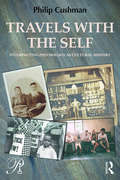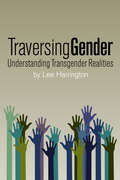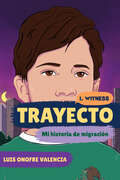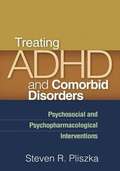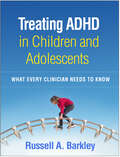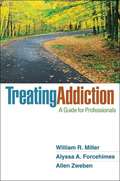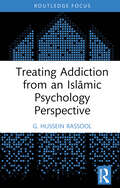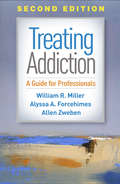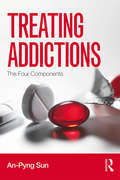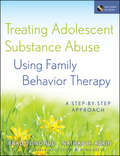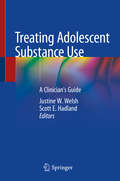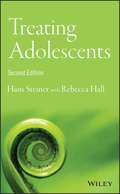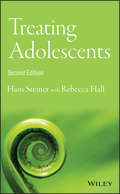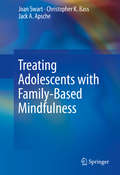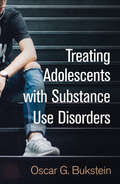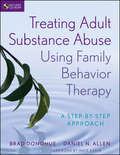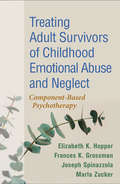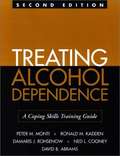- Table View
- List View
Traveling Solo, but Never Alone: Surviving and Thriving After the Death of a Spouse
by Bill HarrisonWhen my wife passed away four days before Christmas in 2017 I was devastated. Mary and I had a challenging, exciting and adventurous life together for over 53 years, traveling the globe and finding success in a number of careers. But suddenly she was gone. I had lost my identity and purpose. I cried out: “What now, Lord?” “Why am I still here?” “What do you have in store for me now?” And over the ensuing months God began to show me that, although my role had drastically changed, my identity as his child remained the same and that he still had a purpose in my being here, which he began to reveal to me. And he reassured me, though I was now traveling solo, I would never be alone. This book is the story of my journey since Mary’s passing and what I have learned from my experiences. I hope it will be a source of inspiration for those who have experienced great loss, encouraging them with the knowledge that God is not finished with them, but has much more for them to learn, experience and accomplish. To follow my continuing journey see my blogs at https://spiritual-entrepreneurship.com/blog-posta/ Finally, Enjoy Spiritual Entrepreneurship: Fulfilling Your God-Ordained Destiny By Bill and Mary Harrison Available Wherever You Buy Your Books
Traveling through Time: How Trauma Plays Itself out in Families, Organizations and Society
by M Gerard Fromm"Bullets don't just travel through skin and bone. They travel through time." These words were tattooed onto the shoulder of a young woman whose father was shot during "The Troubles" in Northern Ireland. This wrenching, volatile but also binding truth is the subject of this book. It's a truth about traumatic experiences that happen to a family, but also to a society, and to the organizations that link these intimate units with the larger context of history and culture. It's also a truth about the way trauma plays out over time, including between generations. Grounded in Erik Erikson's "way of looking at things", the book is a journal of encounters between clinical psychoanalysis and other disciplines, and an inquiry into what might be learned there for both. Sometimes that learning has to do with trauma: the way in which what can't be emotionally contained, thought about or spoken in one part of a system is passed along, with disorganizing, sometimes heartbreaking consequences, to another. After a reflection on dignity, the book examines intergenerational trauma in families, including Erikson's. It then illustrates how trauma to organizations slips below the threshold of awareness and yet continues to wear down its members. The final section examines aspects of the larger society, including radicalization, war trauma, the pandemic and cultural healing. What emerges is the sober yet hopeful truth that what people discover by taking their own emotional experiences seriously, though that might markedly differ from what is accepted in the everyday world, is a primary path toward recovery from trauma.
Travelling with Ghosts: An intimate and inspiring journey
by Shannon Leone Fowler'A cross between H is for Hawk and Wild' Stylist'A brave and necessary record of love, as beautiful as it is heartbreaking' Ann Patchett, author of Commonwealth'Rich and absorbing' Cathy Rentzenbrink, author of The Last Act of Love'Gloriously rendered, beautifully written, but utterly devastating . . . an intimate and inspiring experience' Viv Groskop, ObserverOn a warm evening on a beautiful beach in Thailand, Shannon Leone Fowler's life was shattered when a box jellyfish - the most venomous animal in the world - wrapped itself around her fiancé Sean's legs, stinging and killing him in minutes. Devastated by the tragedy, Shannon, a marine biologist, could not face returning to her home by the ocean. She had travelled the world with Sean, and to honour his memory set out on a new journey - this time alone, to make sense of her loss. From contemplating the silence of Auschwitz, to stumbling through poverty-stricken Romania and Bulgaria, to sitting shiva amid daily bombings in Israel, to finding humour and creativity in Sarajevo, a city still scarred by war, Shannon begins to chart a path through grief - learning to live with loss without letting it destroy her.Includes an interview between Shannon Leone Fowler and her mother, author of international bestseller The Jane Austen Book Club and Man Booker Prize Shortlisted We Are All Completely Beside Ourselves, Karen Joy Fowler.
Travelling with Ghosts: An intimate and inspiring journey
by Shannon Leone FowlerIn the summer of 2002, Shannon Leone Fowler, a twenty-eight-year-old marine biologist, was backpacking with her Australian fiancé Sean in Thailand. They were planning to return to Australia after their excursion to Koh Pha Ngan, but their plans were tragically derailed when a box jellyfish - the most venomous animal in the world - wrapped around Sean's leg, stinging and killing him in minutes as Shannon helplessly watched. Rejecting the Thai authorities attempt to label the death 'drunk drowning,' Shannon ferried his body home to his stunned family - a family to which she suddenly no longer belonged.Shattered and untethered, Shannon set out on a journey to make sense of her loss. From Oswiecim, Poland (the site of Auschwitz) to war-torn Israel, shelled-out Bosnia, poverty-stricken Romania, and finally to Barcelona, where she first met Sean years before, Shannon charts a path through sorrow towards recovery.Read by Rachel Dulude(p) 2017 Tantor
Travels With Casey: My Journey Through Our Dog-crazy Country
by Benoit Denizet-LewisA moody Labrador and his insecure human take a funny, touching cross-country RV trip into the heart of America's relationship with dogs."I don't think my dog likes me very much," New York Times Magazine writer Benoit Denizet-Lewis confesses at the beginning of his journey with his nine-year-old Labrador-mix, Casey. Over the next four months, thirty-two states, and 13,000 miles in a rented motor home, Denizet-Lewis and his canine companion attempt to pay tribute to the most powerful interspecies bond there is, in the country with the highest rate of dog ownership in the world. On the way, Denizet-Lewis--known for his deeply reported dispatches from far corners of American life--meets an irresistible cast of dogs and dog-obsessed humans. Denizet-Lewis and Casey hang out with wolf-dogs in Appalachia, search with a dedicated rescuer of stray dogs in Missouri, spend a full day at a kooky dog park in Manhattan, get pulled over by a K9 cop in Missouri, and visit "Dog Whisperer" Cesar Millan in California. And then there are the pet psychics, dog-wielding hitchhikers, and two nosy women who took their neighbor to court for allegedly failing to pick up her dog's poop. Travels With Casey is a delightfully idiosyncratic blend of memoir and travelogue coupled with an exploration of a dog-loving America. What does our relationship to our dogs tell us about ourselves and our values? Denizet-Lewis explores those questions--and his own canine-related curiosities and insecurities--during his unforgettable road trip through our dog-loving nation.
Travels with the Self: Interpreting Psychology as Cultural History (Psychoanalysis in a New Key Book Series)
by Philip CushmanTravels with the Self uses a hermeneutic perspective to critique psychology and demonstrate why the concept of the self and the modality of cultural history are so vitally important to the profession of psychology. Each chapter focuses on a theory, concept, sociopolitical or professional issue, philosophical problem, or professional activity that has rarely been critiqued from a historical, sociopolitical vantage point. Philip Cushman explores psychology’s involvement in consumerism, racism, shallow understandings of being human, military torture, political resistance, and digital living. In each case, theories and practices are treated as historical artifacts, rather than expressions of a putatively progressive, modern-era science that is uncovering the one, universal truth about human being. In this way, psychological theories and practices, especially pertaining to the concept of the self, are shown to be reflections of the larger moral understandings and political arrangements of their time and place, with implications for how we understand the self in theory and clinical practice. Drawing on the philosophies of critical theory and hermeneutics, Cushman insists on understanding the self, one of the most studied and cherished of psychological concepts, and its ills, practitioners, and healing technologies, as historical/cultural artifacts — surprising, almost sacrilegious, concepts. To this end, each chapter begins with a historical introduction that locates it in the historical time and moral/political space of the nation’s, the profession’s, and the author’s personal context. Travels with the Self brings together highly unusual and controversial writings on contemporary psychology that will appeal to psychoanalysts and psychotherapists, psychologists of all stripes, as well as scholars of philosophy, history, and cultural studies.
Traversing Gender: Understanding Transgender Realities
by Lee HarringtonIn the current age of gender identity and transgender awareness, many questions are coming to light for everyone. Whether brought about by media and cultural attention or personal journeys, individuals who have never heard of transgender, transsexual, or gender variant people can feel lost or confused. Information can be hard to find, and is often fragmented or biased. Meanwhile, trans people are getting a chance to dialogue with each other and finally be heard by the world at large. In Traversing Gender: Understanding Transgender Realities, author Lee Harrington helps make the intimate discussions of gender available for everyone to understand. Topics include: - Understanding the terms "trans" and "transgender" - Differences (and crossovers) between sex, gender, and orientation - The wide array and types of trans experiences - Social networking and emotional support systems for trans people - Navigating medical care, from the common cold to gender-specific procedures - What "transitioning" looks like, from a variety of different approaches - How legal systems interplay with gender and trans issues - Extra challenges based on gender, race, class, age and disability - Skills and information on being successful a trans ally Bringing these personal matters into the light of day, this reader-friendly resource is written for students, professionals, friends, and family members, as well as members of the transgender community itself. It is here for you and those in your life, helping create an opportunity for overcoming the challenges trans people face through awareness and action, making the world a better place one life at a time.
Trayecto: Mi historia de migración (I, Witness)
by Luis Onofre Valencia Amanda UhleA young writer opens a window for young readers on his experiences crossing the US/Mexico border and his life as an undocumented immigrant. When Luis Onofre Valencia was five years old, his father lost his business and was forced to leave Mexico for the United States to find work. Devastated, Luis and his family struggled to keep afloat. When his father asked them to join him in the US, Luis journeyed by truck for several weeks, separate from his family members, who traveled on foot. When the family reunited in Anaheim, Luis faced an entirely new struggle: adapting to a new city and a new culture that did not look kindly on him. With a voice that is both accessible and engaging, Luis brings forward an empowering first-person account of a young man finding strength in his identity, and using this strength to become a community leader, a police intervention activist, and an advocate for mental health.
Treat Concussion, TBI, and PTSD with Vitamins and Antioxidants
by Kedar N. PrasadThe most up-to-date resource on nutritional supplements for the prevention and improved management of concussive injury, TBI, and PTSD • Provides an easy-to-follow program of supplements to optimize the benefits of treatment programs and offer a method of prevention beyond the use of helmets • Shows how standard treatments do not address the oxidative stress, chronic inflammation, and high glutamate levels that promote brain injury progression • Explains how single micronutrients do not provide the same preventive benefits as the synergistic combinations explored in the book The human brain is highly complex. When brain injury strikes, whether from a blow to the head or the shock of physical or emotional trauma, successful treatment requires a multilevel approach, taking into account the health of the brain prior to injury. Multilevel, complementary treatment approaches can also be applied to strengthen the uninjured brain and help prevent neurological injury for those at high risk of concussion, post-traumatic stress disorder, and traumatic brain injury. In this practical scientific guide, leading researcher in cancer, heart disease, and Alzheimer’s prevention Kedar N. Prasad, Ph.D., reveals the latest revolutionary discoveries on the use of antioxidants and micronutrients to manage and prevent concussive injury, TBI, and PTSD. He explains that increased oxidative stress, chronic inflammation, and glutamate release are common underlying factors in these conditions and should be addressed for improved management. He debunks the flawed conclusions of the neurological community that vitamins and antioxidants are ineffective for these conditions, revealing how their studies focused on specific micronutrients rather than synergistic combinations. The author details his easy-to-follow supplement program to treat and prevent these injuries, outlining the correct daily amounts and proper combinations of vitamins, antioxidants, micronutrients, and polyphenolic compounds such as curcumin and resveratrol. Offering the missing complement to standard medical care of brain injury as well as a form of prevention beyond the use of helmets, this guide provides a truly holistic approach to the prevention and management of concussive injury, TBI, and PTSD.
Treating ADHD and Comorbid Disorders
by Steven Pliszka Larry GreenhillChildren and adolescents with attention-deficit/hyperactivity disorder (ADHD) frequently experience co-occurring problems with aggression, mood swings, tics, anxiety, or depression. Organized around detailed case presentations, this highly informative book helps the clinician make sound decisions when assessing and treating the full range of ADHD comorbidities. Experienced child psychiatrist Steven Pliszka offers straightforward guidance on how to avoid common diagnostic errors, develop an individualized medication regimen, minimize health risks and side effects, collaborate successfully with parents, and tailor psychosocial treatments to each family's needs. A reproducible structured interview facilitates sorting out symptoms and distinguishing between different comorbid disorders.
Treating ADHD in Children and Adolescents: What Every Clinician Needs to Know
by Russell A. BarkleyFrom foremost authority Russell A. Barkley, this book presents essential principles and practices for managing attention-deficit/hyperactivity disorder (ADHD) in children and teens. Barkley interweaves the best scientific knowledge with lessons learned from decades of clinical practice and research. He provides guidelines and clinical tips for conducting thorough, accurate assessments and developing and implementing science-based treatment plans. The book is grounded in Barkley's theory of ADHD as a disorder of executive functioning and self-regulation. Ways to collaborate successfully with parents and other professionals are highlighted throughout. In a convenient large-size format, the volume includes 45 reproducible handouts and forms that can be downloaded and printed for repeated use.
Treating Addiction
by William R. Miller Alyssa A. Forcehimes Allen ZwebenAn indispensable practitioner reference and text, this engaging book focuses on how to provide effective help to clients with substance use disorders. The authors, leading authorities on addiction treatment, present a state-of-the-art framework for assessment and treatment. They describe and illustrate evidence-based treatment methods, including cognitive-behavioral, 12-step, motivational, pharmacological, and family approaches. Also addressed are such crucial clinical issues as resistance, maintenance of change, treating co-occurring disorders, and spirituality. Reproducible clinical tools can be photocopied from the book or downloaded and printed in a convenient 8 1/2" x 11" size. Of special utility, the companion website features more than 25 widely used, ready-to-download assessment tools, assembled in one place for the first time, together with the authors' guidance for using them throughout the process of treatment.
Treating Addiction
by William MillerAn indispensable practitioner reference and text, this engaging book focuses on how to provide effective help to clients with substance use disorders. The authors, leading authorities on addiction treatment, present a state-of-the-art framework for assessment and treatment. They describe and illustrate evidence-based treatment methods, including cognitive-behavioral, 12-step, motivational, pharmacological, and family approaches. Also addressed are such crucial clinical issues as resistance, maintenance of change, treating co-occurring disorders, and spirituality. Reproducible clinical tools can be photocopied from the book or downloaded and printed in a convenient 8 1/2" x 11" size. Of special utility, the companion Web page features more than 25 widely used, ready-to-download assessment tools, assembled in one place for the first time, together with the authors' guidance for using them throughout the process of treatment.
Treating Addiction from an Islāmic Psychology Perspective (Islamic Psychology and Psychotherapy)
by G. Hussein RassoolThis book provides an understanding of behavioural and substance disorders from an Islāmic psychology perspective.Despite the religious prohibitions against the use of most substances, addiction is a significant psychosocial and spiritual problem both in Muslim majority countries and among Muslim minorities. However, many Muslim with substance use disorder have been left to suffer in silence because addictive behaviours are considered taboo. Not only do feelings of guilt, shame, and a fear of being stigmatised and excluded from community prevent many from seeking therapeutic and spiritual interventions, there are also limited culturally sensitive service provisions offering help for Muslims with addictive behaviours. This book will synthesise the body of knowledge of the psychology of addiction from an Islāmic perspectives to foster awareness and understanding of addictive behaviours to break that stigma. It will also provide knowledge required to respond effectively to Muslim clients that psychotherapists and counsellors might encounter in their clinical practice, presenting a step-by-step application of Rassool’s Islāmic Psychotherapy Practice model in working with clients with addictive behaviours.This book will be a valuable read for Islāmic psychologists, psychotherapists, and counsellors, addiction researchers and specialists, and students in these fields.
Treating Addiction, Second Edition: A Guide for Professionals
by William R. Miller Alyssa A. Forcehimes Allen ZwebenThis widely respected text and practitioner guide, now revised and expanded, provides a roadmap for effective clinical practice with clients with substance use disorders. Specialists and nonspecialists alike benefit from the authors' expert guidance for planning treatment and selecting from a menu of evidence-based treatment methods. Assessment and intervention strategies are described in detail, and the importance of the therapeutic relationship is emphasized throughout. Lauded for its clarity and accessibility, the text includes engaging case examples, up-to-date knowledge about specific substances, personal reflections from the authors, application exercises, reflection questions, and end-of-chapter bulleted key points. New to This Edition *Chapters on additional treatment approaches: mindfulness, contingency management, and ways to work with concerned significant others. *Chapters on overcoming treatment roadblocks and implementing evidence-based treatments with integrity. *Covers the new four-process framework for motivational interviewing, diagnostic changes in DSM-5, and advances in pharmacotherapy. *Updated throughout with current research and clinical recommendations.
Treating Addictions: The Four Components
by An-Pyng Sun<i>Treating Addictions: The Four Components</i> offers a unique and coherent understanding of addiction. The book begins with a chapter discussing the framework of addiction and the four essential components of treatments—the fundamentals of addiction, co-occurring disorders, quality of life, and macro factors—and subsequent chapters elaborate on each component. Most currently available addiction treatment books present knowledge and skills in separate chapters and fail to integrate all chapters within a single framework that can weave all concepts into a meaningful tapestry. Using a unified framework, this book offers students a comprehensive skill set for treating addictions.
Treating Adolescent Substance Abuse Using Family Behavior Therapy
by Nathan H. Azrin Brad DonohuePraise for Treating Adolescent Substance Abuse Using Family Behavior Therapy"This is an extremely positive and strength-focused text that provides therapists with a structure and the tools to implement interventions that have a long history of promoting the types of clinical changes desired by family members and community stakeholders."--From the Foreword by Scott W. Henggeler, PhD, Professor, Department of Psychiatry and Behavioral Sciences, and Director, Family Services Research Center, Medical University of South Carolina"Kudos to Donohue and Azrin for writing a book that includes all the materials needed to implement FBT with adolescents, including prompting checklists, handouts, and worksheets."--Karol Kumpfer, PhD, Professor, Health Promotion & Education, and Chair, International Study Abroad Committee, College of Health, University of Utah, and former director, SAMHSA's Center for Substance Abuse Prevention"Treating Adolescent Substance Abuse Using Family Behavior Therapy is an important resource for those who wish to provide an empirically supported, strengths-based, behavioral treatment for adolescents with substance-use problems and their parents." --Susan Harrington Godley, RhD, Senior Research Scientist and EBT Coordinating Center Director, and Mark D. Godley, PhD, Director, Research & Development, Chestnut Health Systems"In my practice with adolescents, FBT has proven exceptionally effective in drawing families closer together and yielding improved outcomes. This remarkably supportive approach helps young people develop critical skills necessary to live a fulfilling and drug-free lifestyle. This book clearly illustrates how to implement the interventions with ease and exemplifies the deeply gratifying experience of FBT."--Stephen A. Culp, MEd, NCC, LPCC, Addiction Services Therapist, Comprehend, Inc., Maysville, KYListed in multiple national clearinghouses, including SAMHSA's National Registry of Evidence-based Programs and Practices and the CEBC, Family Behavior Therapy (FBT) is a scientifically supported treatment for adolescent substance abuse and its many associated problems. Written by Brad Donohue and Nathan Azrin--the premier researchers and practitioners of FBT--Treating Adolescent Substance Abuse Using Family Behavior Therapy is the first book of its kind to provide mental health professionals with the practical, step-by-step guidance needed to use this evidence-based treatment.Filled with case studies, checklists, worksheets, and handouts, this essential guide features:Strategies to assist in effective goal-setting, treatment plans, and family managementMotivational enhancement exercises to encourage youth into a problem-free lifestyleMethods to effectively address contextual issues such as noncompliance and cultureStandardized treatments to assist in eliminating problems that coexist with substance abuse, including unemployment, depression, behavioral misconduct, and family dysfunctionAn accompanying CD-ROM contains all the book's record-keeping forms, checklists, assignments, progress notes, agendas, and worksheets in a customizable format.
Treating Adolescent Substance Use: A Clinician's Guide
by Justine W. Welsh Scott E. HadlandClinicians are now facing new substance use-related challenges such as the opioid crisis, a changing political landscape regarding marijuana, and the emergence of new delivery devices such as e-cigarettes. Unfortunately, it is more critical than ever that clinicians caring for adolescents have a proficiency in treating substance use. <p><p> This book is a comprehensive clinical guide that discusses the prevalence of substance use among adolescents and young adults, as well as prevention strategies, available screening methods, practical treatment applications and their outcomes. Using a multidisciplinary approach with inclusion of authors from diverse clinical backgrounds, this definitive guide provides the best practices for treating adolescent substance use disorders from medical, behavioral, and social standpoints. <p> Supplemented with case examples and written by experts in the field, Treating Adolescent Substance Use appeals to all clinicians that treat adolescent patients.
Treating Adolescents
by Rebecca Hall Hans SteinerUnderstand disruptive behaviors and ADHD more deeply, Treat anxiety, depression, and mood disorders more effectively, Handle psychiatric traumas and related psychopathologies, Delve into substance abuse, self-harm, eating disorders, and more.
Treating Adolescents (Library Of Current Clinical Technique)
by Hans Steiner Rebecca E. HallA unique guide to adolescent psychopathology, using a developmental approach Treating Adolescents is a comprehensive guide to adolescent mental health care, synthesizing evidence-based practice and practice-based perspectives to give providers the best advice available. By limiting the discussion to disorders which appear during adolescence, this useful manual can delve more deeply into each to present extensive evidence and practice-based rationales for approaching a range of psychopathologies. This edition has been revised to reflect the changes in the DSM-5 and the ICD-10, with entirely new chapters on ADHD, learning and executive function, bipolar and mood disorders, sleep disorders, and suicide and self-injury. Coverage includes non-therapy interventions, such as pharmacological and environmental. The discussion of schizophrenia and psychotic disorders includes adolescent presentations of Pervasive Developmental Disorders and their relationship to classical schizophrenia. In a developmental approach to adolescent psychopathology, different treatments are carefully integrated and matched to pathogenic processes in an effort to disrupt causal loops. This book provides in-depth guidance for providers seeking well-rounded treatment plans, with detailed explanations and expert insight. Understand disruptive behaviors and ADHD more deeply Treat anxiety, depression, and mood disorders more effectively Handle psychiatric traumas and related psychopathologies Delve into substance abuse, self-harm, eating disorders, and more Current scholarship favors developmental approaches to psychopathology and supports an emphasis on integrated treatment packages, including environmental, biologic, and psychological interventions. With full integration of practice and research, Treating Adolescents is a comprehensive reference for constructing a complete treatment strategy.
Treating Adolescents with Family-Based Mindfulness
by Joan Swart Christopher K. Bass Jack A. ApscheA new take on therapeutic mindfulness with specific applications to troubled and delinquent youth is the focus of this innovative text. It introduces Family Mode Deactivation Therapy (FMDT) and its core concepts and methodologies, differentiating it from other cognitive and mindfulness therapies for adolescents with problem behaviors and comorbid conditions. Step by step applications of FMDT from case conceptualization to assessment and treatment are featured, with detailed case studies demonstrating its effectiveness in treating mood disorders, aggressive behavior and trauma and guidelines for its use with abusive families and other complex cases. The book's depth of clinical detail and appendix of therapist tools make it especially practical. Included in the coverage: A comparison of MDT with other cognitive approaches. The empirical status of MDT. Mindfulness in MDT process, and in the treatment room. FMDT and sexual offender youth. MDT and mindfulness in the context of trauma. Treating the "untreatable": FMDT and challenging populations. While Treating Adolescents with Family-Based Mindfulness is immediately useful to practicing psychotherapists, it should also be of interest to other professionals with a role in adolescent health care, such as policymakers, social workers, supervisors, juvenile corrections and youth center personnel and students and researchers.
Treating Adolescents with Substance Use Disorders
by Oscar G. BuksteinFrom a leading addiction specialist, this highly practical book explores what works in treating adolescents. Oscar G. Bukstein answers the clinician's vital question: "What do I do now?" He describes best practices for enhancing youths' motivation for change, teaching a variety of recovery skills, and implementing parent management training and parent–adolescent problem solving. The book covers ways to foster a prosocial peer network and to address mental health problems that co-occur with substance use disorders (SUDs). Clinicians can combine the strategies into an integrated approach or pick and choose depending on the needs of individual clients. Reproducible handouts and worksheets can be downloaded and printed in a convenient 8 1/2" x 11" size.
Treating Adult Substance Abuse Using Family Behavior Therapy
by Nathan H. Azrin Brad Donohue Daniel N. AllenPraise for Treating Adult Substance Abuse Using Family Behavior Therapy"Treating Adult Substance Abuse Using Family Behavior Therapy is a welcome addition to the evidence-based substance use disorder treatment literature. This volume provides a large amount of helpful information, materials, and step-by-step instructions for implementing and troubleshooting family-based behavioral treatment for substance use problems."--Mark B. Sobell, PhD, ABPP, Professor, and Linda Sobell, PhD, ABPP, Professor and Associate Director of Clinical Training, Center for Psychological Studies, Nova Southeastern University, Fort Lauderdale-Davie, FL"I strongly recommend Treating Adult Substance Abuse Using Family Behavior Therapy. Donohue and Allen give readers a step-by-step approach using empirical strategies, client-therapist dialogues, checklists, and handouts that make the therapy process clear and concrete. This book is a must-read for all who want to use FBT in their practice."--Robert J. Meyers, PhD, Emeritus Associate Research Professor of Psychology, University of New Mexico"I am delighted with the book Treating Adult Substance Abuse Using Family Behavior Therapy. As a relatively new therapist, I used the FBT protocols in a practice setting and the highly structured interventions provided me a sense of confidence while developing professional competence in working with very challenging populations. Although simple in theory, families are empowered by these absolutely positive techniques."--Amy S. Bizjak, Staff Development Training Coordinator, Bethesda Children's Home, Meadville, PAPractical, step-by-step guidance for using Family Behavior Therapy (FBT) in the treatment of adults dealing with substance abuseTreating Adult Substance Abuse Using Family Behavior Therapy clearly explains how this evidence-supported treatment can be implemented in a flexible, straightforward manner and covers:The underlying framework and infrastructure necessary for treatment providers to effectively implement FBTStrategies for establishing effective consumer-driven treatment plans with clients prior to each sessionSkills training and exercises that teach conflict management and how to build healthy relationshipsStandardized methods for managing problems that coexist with substance abuse, such as unemployment, depression, and incarcerationWith an accompanying CD-ROM containing worksheets, handouts, and other practical materials, this hands-on behavioral approach to therapy equips all mental health professionals with effective strategies to help adult substance abusers and their families through the recovery process.
Treating Adult Survivors of Childhood Emotional Abuse and Neglect: Component-Based Psychotherapy
by Christine A. Courtois Bessel A. van der Kolk Elizabeth K. Hopper Frances K. Grossman Joseph Spinazzola Marla ZuckerGrounded in 40 years of clinical practice and research, this book provides a systematic yet flexible evidence-informed framework for treating adult survivors of complex trauma, particularly those exposed to chronic emotional abuse or neglect. Component-based psychotherapy (CBP) addresses four primary treatment components that can be tailored to each client's unique needs--relationship, regulation, dissociative parts, and narrative. Vivid extended case examples illustrate CBP intervention strategies and bring to life both the client's and therapist's internal experiences. The appendix features a reproducible multipage clinician self-assessment tool that can be downloaded and printed in a convenient 8 1/2" x 11" size. See also Treating Traumatic Stress in Children and Adolescents, Second Edition, by Margaret E. Blaustein and Kristine M. Kinniburgh, which presents a complementary approach also developed at The Trauma Center at Justice Resource Institute.
Treating Alcohol Dependence: A Coping Skills Training Guide (Second Edition)
by Peter M. Monti Ronald M. Kadden Ned L. Cooney David B. Abrams Damaris J. RohsenowProvides session-by-session instructions for therapists who wish to apply a coping skills training approach to the treatment of alcohol dependence. Skills for coping with specific drinking triggers, communicating effectively, and making general lifestyle modifications are outlined. The second edition adds guidelines for conducting cue exposure treatment and addressing dual diagnosis issues. Annotation c. Book News, Inc., Portland, OR (booknews.com)

